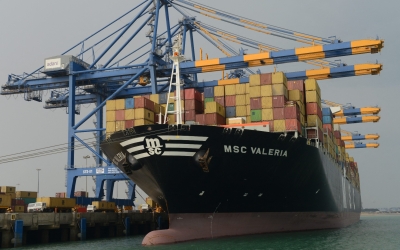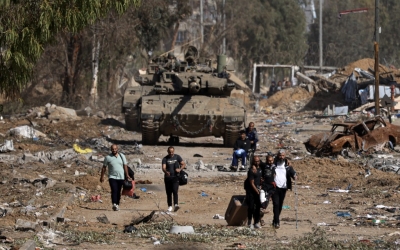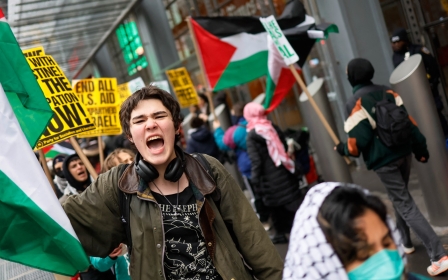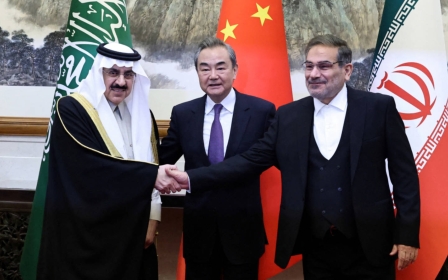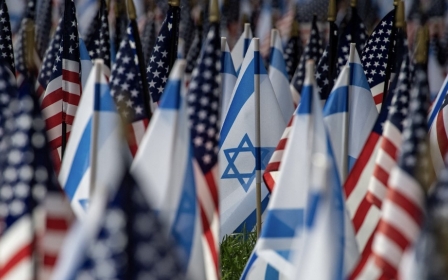Dark clouds are gathering over the Red Sea for 2024
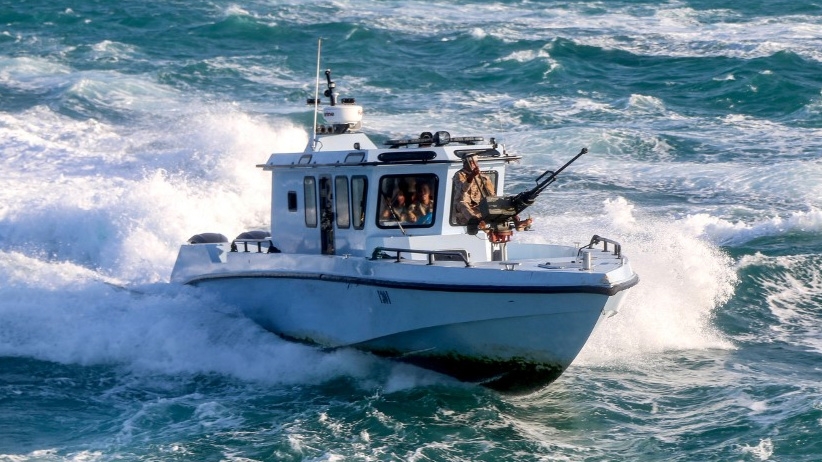
History loves surprises.
Regardless of how much humankind has refined its predictive capabilities, including the use of the still too-unknown artificial intelligence, world events continue to take unexpected turns, disrupting previous expectations and causing major disappointments and serious harm.
In the not-so-distant future, 2023 might well be remembered as the year of collapsed narratives and unfulfilled expectations.
Inflation would be temporary, Ukraine would win; Russia would break down under sanctions; halting energy supplies from Moscow would not affect Europe's industrial output; China would be in decline; democracies would prevail against autocracies; the Abraham Accords and an Israel-Saudi deal would promote peace in the Middle East; the US-led rules-based world order would be the only game in town … the list could go on.
Ukraine is desperately trying to keep the attention of the US and other western countries while its capabilities to sustain the conflict with Russia decrease dramatically.
New MEE newsletter: Jerusalem Dispatch
Sign up to get the latest insights and analysis on Israel-Palestine, alongside Turkey Unpacked and other MEE newsletters
Israel is instead trying for the inattention of the US and other western countries while it attempts the ethnic cleansing of Gaza as a first step toward the Greater Israel dreamed about by its far-right political forces.
The US and the EU are searching for an exit strategy both in Ukraine and in the Israel-Palestine conflict. It is not certain that 2024 will provide one.
The outcome of the conflicts in Ukraine and Gaza will contribute to shaping the balance of power across Eurasia, while the relationship between the US and its European allies on one side, and Russia, China and Iran on the other, remains tense.
Graveyard of broken dreams
Last September, at the G20 summit in India, the US unveiled its latest public relations stunt to check China’s rising power.
US President Joe Biden, flanked by Indian Prime Minister Narendra Modi, the rulers of Saudi Arabia and the UAE, and the leaders of the three major EU economies, Germany, France and Italy, came out with a proposal for a new economic corridor supposed to connect India to Europe.
They called it IMEC - the India-Middle East-Europe Corridor.
The corridor’s official purpose is to reduce the time that goods take to reach Europe from India. The countries involved, implausibly, say they will achieve such a result by shipping cargos from India to Saudi Arabia and the UAE, loading them onto trains headed to Haifa in Israel, and then onto ships again, to Europe.
It would involve at least six loading and unloading processes in five or six different countries.
The unofficial purpose of IMEC is to offer an alternative to the Belt and Road Initiative (BRI) launched by China in 2013 to create a major multimodal connectivity network across Eurasia.
Despite the 10-year delay, IMEC now pretends to compete with the BRI. Like several previous western projects, such as Build Back Better, IMEC could easily end up in the graveyard of broken dreams in the “too little too late” section. Ultimately, time and markets will tell if such a complex option will work.
A further ambition for IMEC is for it to replace the Red Sea and Suez Canal as the major sea economic corridor to Europe, further boosting the vision outlined in the Abraham Accords.
Ironically, however, issues in the Red Sea soon came knocking on the door of geopolitics and geoeconomics.
Regional escalation
A major fear regarding the ongoing conflict in Gaza is its possible regional enlargement. While most eyes were focused on Israel's northern front and the risk of a second conflict starting with Hezbollah in Lebanon, it has been the poorest and least-armed resistance movement that delivered the year-end’s major surprise: Yemen’s Houthis.
In the only display of concrete solidarity with Palestinians in the Arab world so far, the Houthis have begun to selectively target ships bound for Israel or affiliated with it. The net result is that Israel’s Eilat port traffic has been reduced by 85 percent.
In the only display of concrete solidarity with Palestinians in the Arab world so far, the Houthis have begun to selectively target ships bound for Israel
The Houthis are applying their own version of western democracies’ double standards, in that all other shipping is free to pass, with Russian, Chinese and Iranian ships, and vessels registered in the rest of the world, moving undisturbed across the Bab el-Mandeb strait and entering the Red Sea heading toward Suez.
Major carriers temporarily halted navigation in the Red Sea, leaving only two options: the longer and costlier sea route around the southern tip of Africa, or the International North-South Transport Corridor (INSTC) connecting Iran and Russia through the Caucasus.
The first one could cause inflationary spikes; the second serious political problems for western democracies.
The US reacted to the Houthi attacks on shipping with a military operation called “Prosperity Guardian”, tasked with safeguarding freedom of navigation through the Red Sea, the Gulf of Aden and the Bab el-Mandeb strait.
Hard new realities
If this initiative was supposed to demonstrate US leadership in the area and enforce freedom of navigation, the results were partially disappointing.
True, some major carriers such as Maersk resumed their operations in the Red Sea after suspending them - but a Houthi attack on a Maersk vessel on 31 December saw them suspended again. This incident saw US strikes on Houthi boats that caused the death of 10 Yemeni fighters.
A further disappointing aspect, given that Prosperity Guardian was all about stopping the disruption of international trade, was the relatively few "global West" countries that signed up - several countries who were named as participants, including Australia, Spain, Italy, and France, reportedly rejected the Pentagon’s request to take part in the operation under US command, with Spain declaring it would only participate under Nato or European command.
The only Arab country to participate was tiny Bahrain, and from the "global rest", the Seychelles - yes, the Seychelles!
Two of the states crucially affected by the disruption of trade in the Red Sea - and strong partners of the US - Egypt and Saudi Arabia, have so far decided not to join Prosperity Guardian.
This speaks volumes about US credibility and reliability even among its major allies.
All sides - except Israel - claim that they want to avoid escalation, but the confrontation is taking place in too many places beyond Gaza and Ukraine: in Lebanon, Syria, Iraq and the Red Sea. The risks of miscalculation and consequent potential escalation remain high.
Dark clouds, then, seem to be gathering for 2024.
If 2023 was the year of collapsed narratives and unfulfilled expectations, then 2024 could bring a rude awakening to hard new realities.
The views expressed in this article belong to the author and do not necessarily reflect the editorial policy of Middle East Eye.
This article is available in French on Middle East Eye French edition.
Middle East Eye delivers independent and unrivalled coverage and analysis of the Middle East, North Africa and beyond. To learn more about republishing this content and the associated fees, please fill out this form. More about MEE can be found here.



